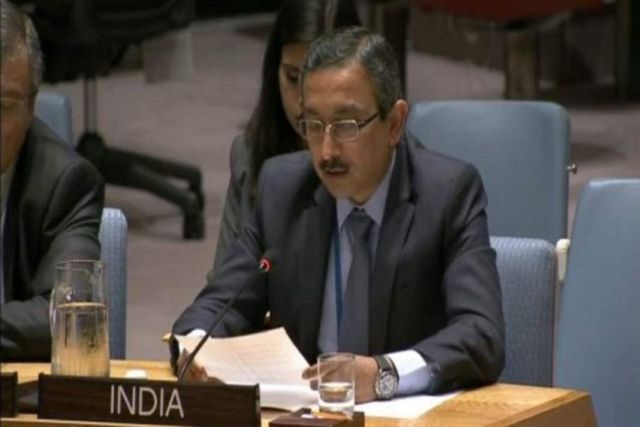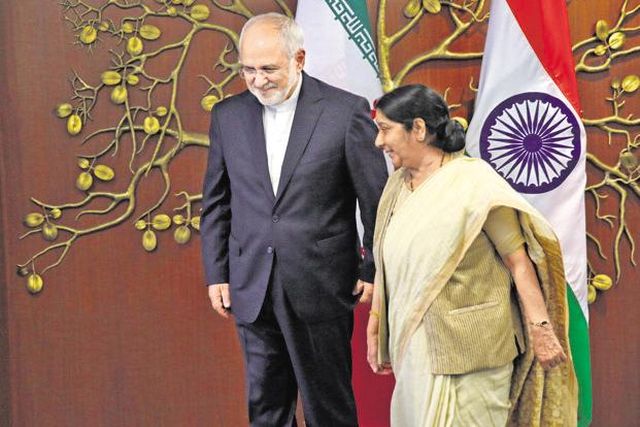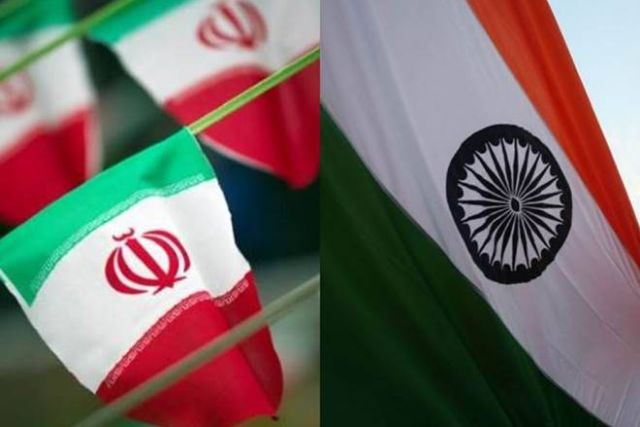
by admin | May 25, 2021 | News

Tanmaya Lal
By Arul Louis,
United Nations : Facing the prospects of US sanctions over its deals with Russia and Iran, India has used the annual General Assembly debate on Washington’s economic blockade of Cuba to lash out against unilateral embargoes.
“As the world’s largest democracy with abiding faith in multi-lateralism, India stands in solidarity with this Assembly in its unambiguous rejection of domestic laws having extraterritorial impact,” Tanmaya Lal, India’s Deputy Permanent Representative, said on Wednesday.
Year after year, the General Assembly has voted for lifting the sanctions on Cuba and last year 191 of the 193 UN members backed the resolution with only the US and Israel opposing it.
India has always opposed the Cuban sanctions.
“Every year this Assembly has rejected the imposition of laws and regulations with extra-territorial impact and all other forms of coercive economic measures that hurt the progress and prosperity of the people the world over,” Lal said.
The Cuban sanctions do not directly affect countries like India that trade with Havana.
Although the US embargo mostly restricts engagement by American companies and individuals with the Caribbean country, it does have spillover effects on companies from other countries.
India and most countries oppose the Cuban embargo on principle and maintain that domestic laws should not have extra-territorial effect on other countries.
Only the Security Council can impose international sanctions under the UN Charter as it has done, for example with North Korea.
The General Assembly has called on countries “to refrain from promulgating and applying and to repeal and invalidate laws and measures that have extra-territorial effects affecting the sovereignty of other States, in conformity with their obligations under the UN Charter and international law”, Lal said.
The US has warned India it could face sanctions under its domestic law, the Countering America’s Adversaries Through Sanctions Act (CAATSA), for a deal to buy an advanced air defence missile system, the S400, at an estimated cost of about $5 billion from Russia and other defence purchases.
Mainly motivated by alleged Russian interference in the 2016 presidential elections, the US Congress enacted CAATSA that President Donald Trump signed into law.
While that law also has some impact on Iran, Trump has separately acted to impose more stringent sanctions on countries trading with Tehran after reneging the agreement signed by the five permanent members of the UN Security Council and Germany and the European Union with Iran to end its quest for nuclear weapons.
The Iran sanctions that come into force on November 4 that could hit India, which buys oil from Tehran and has several projects there like the Chabahar port development.
Trump could exempt India from the sanctions, but has not said so far if he would.
Scores of countries that spoke during the debate attacked the sanctions on Cuba and demanded that they be lifted.
Representatives of the Non-Aligned Movement and the Group of 77, as well as regional groups like those representing Latin America, the Caribbean and Southeast Asia called for lifting of the sanctions.
(Arul Louis can be reached at arul.l@ians.in and followed on Twitter @arulouis)
—IANS

by admin | May 25, 2021 | Corporate, Corporate Governance, News, Politics
 By Arul Louis,
By Arul Louis,
United Nations : External Affairs Minister Sushma Swaraj and Iranian Foreign Minister Mohammad Javad Zarif discussed US sanctions against Tehran amidst American President Donald Trump issuing dire warnings at the Security Council against violating the embargo.
India and Iran “shared each others’ position about where we stand at this point of time” on the sanctions, External Affairs Ministry spokesman Raveesh Kumar told reporters after the Ministers’ meeting on the sidelines of the UN General Assembly session here on Wednesday.
At the Security Counci, Trump said that the sanctions against Iran will come into full force in November and warned “any individual who fail to comply with these sanctions will face full consequences”.
Kumar said that India was engaged with all the stakeholders dealing with the sanctions and, therefore, it discussed it with Iran also.
Zarif told Sushma Swaraj about Iran’s interaction with the European Union (EU) and other countries over the sanctions, according to Kumar.
The spokesman said that Iran and India had “civilisational ties” going back in time and the discussions went beyond the sanctions issue.
Trump pulled Washington out of the nuclear deal known as the Joint Comprehensive Plan of Action (JCPOA) that Iran signed with the five permanent members of the UN Security Council, Germany and the EU, to end sanctions in return for Teheran stopping nuclear weapons development.
The EU and most countries back the nuclear deal and oppose US sanctions and Trump found himself isolated at the Security Council.
Washington’s allies, British Prime Minister Theresa May and French President Emmanuel Macron, openly opposed Trump at the Security Council meeting and expressed their support for the agreement with Iran.
Kumar declined to comment on foreign media reports that India was going to stop importing Iranian oil.
(Arul Louis can be reached at arul.l@ians.in and followed on Twitter at @arulouis)
—IANS

by admin | May 25, 2021 | Business, Corporate, Corporate Governance, Economy, Interviews, Large Enterprise, News, Politics
 By Vishav and Manish Gupta,
By Vishav and Manish Gupta,
New Delhi : India is fully prepared to deal with any fallout of the US sanctions on Iran and has made necessary provisions for every possible scenario, says a top government adviser.
However, he said, it was better to wait till the actual events happen and react quickly to them, rather than pre-commit to a certain sequence of actions.
Sanjeev Sanyal, the Finance Ministry’s Principal Economic Adviser, told IANS in an interview that while the economy was gathering pace, there were several external factors which were a concern — including the US-China trade war, tightening of US monetary policy and rising oil prices, apart from the trade sanctions on Iran.
“We have already weighed our options… various scenarios have been thought about and in each one, certain series of sequences have been planned. Provisions have somewhat been made where necessary. In many cases, you just have to do it when it happens. The key is to react fast.
“So rather than predispose ourselves to a particular line of response, what we can do is have a whole bunch of options and then as things evolve, we know which option to take. The point is to maintain optionality rather than pre-commit to a certain sequence,” Sanyal said.
Last month, the Trump administration reimposed the first batch of Iran sanctions since Washington withdrew from the 2015 nuclear deal, with sanctions on oil sales coming into force from November.
Sanctions against Iran are not the only external factor which is a concern for the Indian economy. Finance Minister Arun Jaitley, in his first address after resuming office after a long absence due to his kidney transplant, had also said that the challenges to the Indian economy were mainly from external factors such as rising oil prices and the US-China trade war.
Sanyal agreed and said: “There is the trade war looming. We have oil prices which we need to look out for. And the US is tightening its monetary policy. These are not new concerns; they have been building up for some weeks now, if not months. But these are concerns that will have an impact on us.”
He said while the impact of these events is “non-quantifiable”, the best option for India is to “watch carefully what happens, how systems evolve and to respond quickly to protect national interests”.
“The point is that since we don’t know how the trade war and many of these things will pan out, or oil prices for that matter, so we will have to wait,” Sanyal said.
On domestic concerns, the economist said while all evidence showed that the economy was gathering pace, it was important to maintain that momentum. He said the government’s focus was to clean up the banking system, ensure credit flow to micro, small and medium enterprises (MSMEs) and simplify the GST.
(Vishav and Manish can be contacted at vishav@ians.in and manish.g@ians.in)
—IANS



